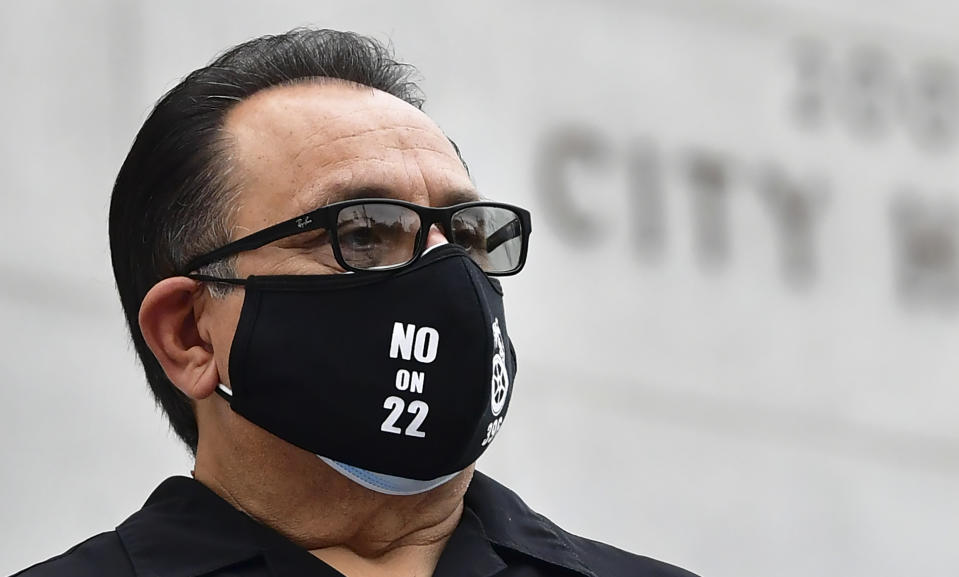California’s Prop. 22 removes a ‘dark cloud’ for the likes of Uber and Lyft
Uber (UBER), Lyft (LYFT), and a slew of companies that rely on gig workers and the investors who back them are breathing sighs of relief, after California voters said yes to a contentious ballot measure that exempts them from a law that threatened to upend their business models.
The measure, Proposition 22, exempts companies from classifying app-based transportation drivers as employees, so they can remain contractors, albeit with some health benefits and pay guarantees. That proposition exempts those companies from a California law called Assembly Bill 5 (AB 5), which reclassified many contractors as employees and gave them benefits such as overtime pay and sick leave, among others.
Prop 22 is seen as a major win for the likes of Uber, Lyft, Instacart, and DoorDash, all of which formed their businesses around gig workers ferrying riders and goods as independent contractors, according to Wedbush analyst Dan Ives.

“To this point, 58% of voters in California voted YES and passed Prop 22, which will send a ripple impact as investors were worried if Prop 22 did not pass this would significantly impact the core DNA of the Gig Economy and ultimately the revenue model for Lyft and Uber,” Ives wrote in a research note Wednesday morning.
“Taking a step back, this removes a significant overhang and dark cloud for the likes of Uber and Lyft and ends this ‘head scratching’ AB5 legislation chapter that was a major threat to the future of the Gig Economy and thousands of drivers throughout California,” Ives wrote, adding that his firm would maintain its outperform ratings for both companies.
Just after 1 p.m. on Wednesday, Uber (UBER) stock was up nearly 12% and Lyft (LYFT) was up nearly 9%.
‘California voters have spoken’
Without Prop. 22, Assembly Bill 5 would have been the law of the land, and companies would have been forced to classify their workers as employees and provide them with the same benefits afforded to members of California’s workforce. A $200 million campaign by the firms may have helped push Californians in their favor.
“California voters have spoken, and they stood with more than a million drivers who clearly said they want independence plus benefits,” Lyft Chief Policy Officer and former U.S. Secretary of Transportation under President Obama, Anthony Foxx, said in a prepared statement.
“Prop 22 is now the first law in the nation requiring health, disability and earnings benefits for gig workers. Lyft stands ready to work with all interested parties, including drivers, labor unions and policymakers, to build a stronger safety net for gig workers in the U.S.,” Foxx added.
According to Ives, 16% of Lyft’s revenue and 5% of Uber’s come from California. Without Prop. 22, the companies previously stated that they would have needed to either change service regularity and fees in the state, or leave the state entirely to avoid higher operating costs associated with classifying workers as employees.
‘A major win for companies such as Uber and Lyft’
California is the fifth largest economy in the world, and there have been doubts about whether either firm would have pulled service out of the state; however, such a move wouldn’t have been without precedent. Uber and Lyft both ditched Austin, Texas, after the city voted to require stricter background checks and fingerprints for drivers. The companies remained out of the city for a year until a campaign by the ride-hailing giants pushed the Texas State Legislature to overrule the city’s requirements.
The Prop. 22 vote is largely expected to be viewed as a bellwether for other states that were mulling increasing protections for gig workers. The move should give confidence to investors who feared that if Prop 22 became law, states across the country would have moved to introduce legislation similar to AB5.
Jesse Jauregui, a partner in Alston & Bird’s labor & employment group, told Yahoo Finance that while he expects legal pushback may continue, Prop. 22 “sets the tone” for other states to follow. The measure is pointing to a new “3rd way” of structuring the nature of work and may become a model for other gig workforces to follow, he said via email.
“With Proposition 22, the California electorate has effectively classified ride share drivers as a legal category of gig economy independent contractors, a major win for companies such as Uber and Lyft,” he said.
Yahoo Finance reached out to Uber and did not receive an immediate response.
Read more:
What is Section 230, the controversial internet law Trump wants to dismantle?
The Justice Department’s fight against Google doesn’t spell the end of Big Tech
‘Dangerous for Democracy’: Big Tech hearing gives clues on future of antitrust law
Alexis Keenan is a legal reporter for Yahoo Finance and former litigation attorney.
Follow Alexis Keenan on Twitter @alexiskweed.
Got a tip? Email Daniel Howley at dhowley@yahoofinance.com over via encrypted mail at danielphowley@protonmail.com, and follow him on Twitter at @DanielHowley.
Follow Yahoo Finance on Twitter, Facebook, Instagram, Flipboard, SmartNews, LinkedIn, YouTube, and reddit.
Find live stock market quotes and the latest business and finance news
For tutorials and information on investing and trading stocks, check out Cashay


